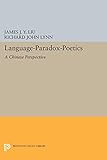Language-Paradox-Poetics : A Chinese Perspective / James J.Y. Liu; ed. by Richard John Lynn.
Material type: TextSeries: Princeton Legacy Library ; 934Publisher: Princeton, NJ : Princeton University Press, [2014]Copyright date: ©1988Edition: Course BookDescription: 1 online resource (192 p.)Content type:
TextSeries: Princeton Legacy Library ; 934Publisher: Princeton, NJ : Princeton University Press, [2014]Copyright date: ©1988Edition: Course BookDescription: 1 online resource (192 p.)Content type: - 9780691606187
- 9781400859689
- 495.1/16 19
- PL1279
- online - DeGruyter
- Issued also in print.
| Item type | Current library | Call number | URL | Status | Notes | Barcode | |
|---|---|---|---|---|---|---|---|
 eBook
eBook
|
Biblioteca "Angelicum" Pont. Univ. S.Tommaso d'Aquino Nuvola online | online - DeGruyter (Browse shelf(Opens below)) | Online access | Not for loan (Accesso limitato) | Accesso per gli utenti autorizzati / Access for authorized users | (dgr)9781400859689 |
Frontmatter -- Contents -- Editor's Foreword -- Introduction -- 1. The Paradox Of Language -- 2. The Metaparadox of Poetics -- 3. The Poetics of Paradox -- 4. The Paradox of Interpretation -- Afterword: Impersonal Personality -- Chinese Words and Names -- Abbreviations -- Notes -- Works Cited -- Index
restricted access online access with authorization star
http://purl.org/coar/access_right/c_16ec
In attempting to define a "poetics of paradox" from a traditional Chinese standpoint, James Liu explores through a comparative approach linguistic, textual, and interpretive problems of relevance to Western literary criticism. Liu's study evolves from a paradoxical view--originating from early Confucian and Daoist philosophical texts--that the less is "said" in poetry, the more is "meant." Such a view implied the existence of paradox in the very use of language and led traditional Chinese hermeneutics to a study of "metaparadox"--the use of language to explicate texts the meaning of which transcends language itself.As Liu illustrates elements of traditional Chinese hermeneutics with examples of poetic and critical works, he makes comparisons with the works of such Western literary figures as Shakespeare, Mallarme, Pound, Ionesco, Derrida, and Shepard. The comparisons bring to light a crucial difference in conceptualization of language: Chinese critics, especially those influenced by Daoism and Buddhism, seem to have held a deitic view of language (language points to things), whereas Western critics seem to have thought of language as primarily mimetic (language represents things). Liu examines the consequences of these views, showing how both offer insights into the "meaning" of text and to what extent both have led to a "metaparadox of interpretation."Originally published in 1988.The Princeton Legacy Library uses the latest print-on-demand technology to again make available previously out-of-print books from the distinguished backlist of Princeton University Press. These editions preserve the original texts of these important books while presenting them in durable paperback and hardcover editions. The goal of the Princeton Legacy Library is to vastly increase access to the rich scholarly heritage found in the thousands of books published by Princeton University Press since its founding in 1905.
Issued also in print.
Mode of access: Internet via World Wide Web.
In English.
Description based on online resource; title from PDF title page (publisher's Web site, viewed 30. Aug 2021)


